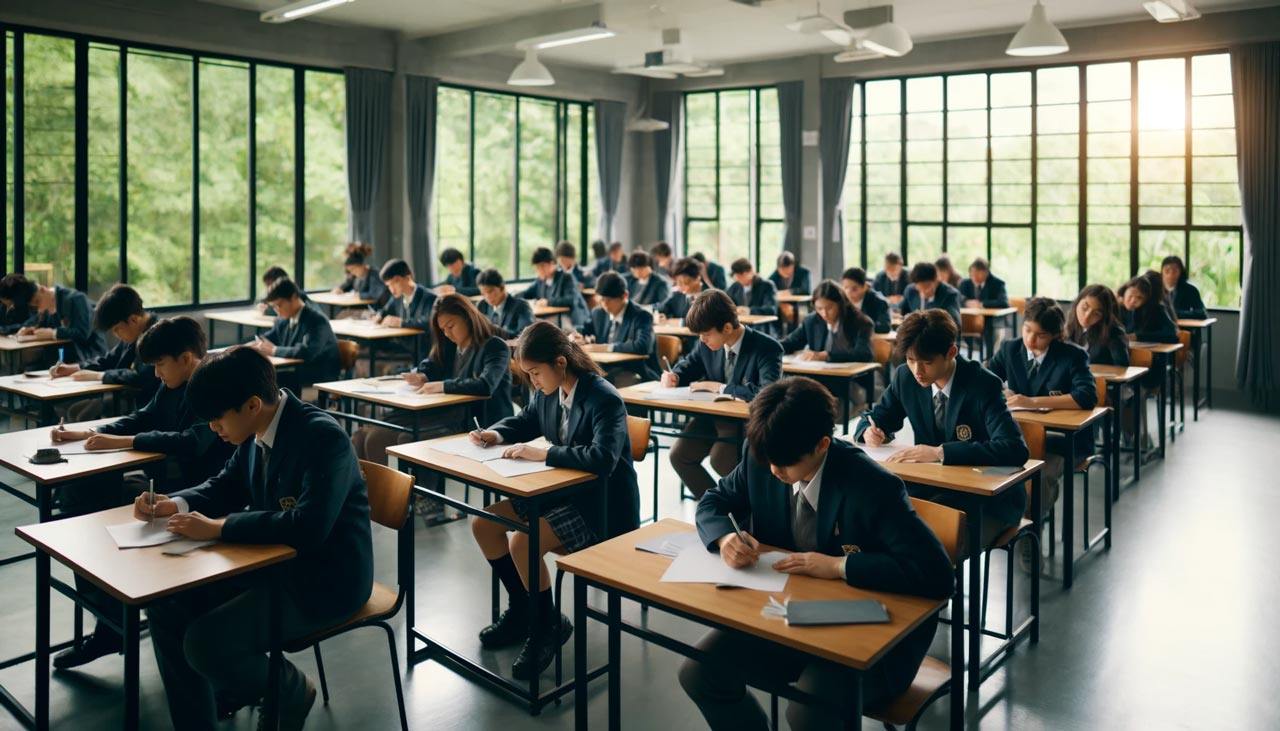

Traditional vs. Alternative High Schools: Which Prepare Your Child Best for University?
Published on: May 20, 2024
Parents fear that alternative high schools won’t adequately prepare their children for the rigors of university.
This fear is compounded by the assumption that traditional high schools are the gold standard for academic preparation.
In this article, we’ll address these concerns head-on, offering a reality check on the effectiveness of traditional education and showcasing the strengths of progressive approaches used by alternative high schools like Pear Tree School.
As an experienced educator and school director, I’ve had countless conversations with parents concerned about their children’s future. One memorable discussion was with a university professor who lamented the preparedness of his program’s handpicked economics students. Despite being selected for their dedication, these students relied heavily on Wikipedia for citations and struggled to write coherent essays.
This raises an important question: if traditional high schools are supposedly ‘the best preparation for university’, why are the students coming from these traditional institutions falling short?
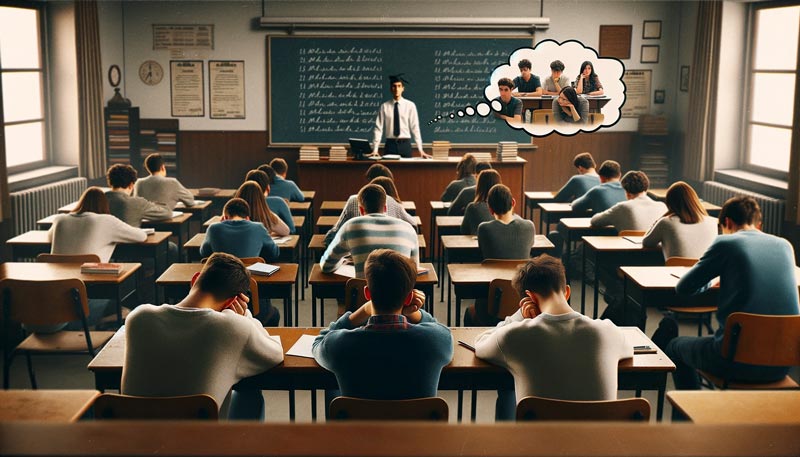

The Reality of Traditional High Schools: Will Your Kids Really Be College Ready?
Traditional high schools emphasize standardized testing, rote memorization, and a rigid curriculum. While these methods might seem effective on the surface, they often fail to develop critical thinking, problem-solving, and independent research skills. A study by the National Center for Education Statistics found that only 37% of high school seniors are prepared for college-level coursework in reading and math.
High school students are hardly ever asked to write anything of significant length.
Marc Tucker, Education Week
Moreover, a report from the Association of American Colleges and Universities (AAC&U) highlighted that 74% of employers believe recent graduates lack critical thinking and problem-solving skills. These statistics indicate a significant gap between the skills taught in traditional high schools and those required in higher education and the workforce.
As noted in the AAC&U report, employers believe that collaborative skills, critical thinking skills, data analysis skills, and application of knowledge and skills are the top 4 skills needed.
Traditional high schools prioritize individual work over group work, rote memorization over higher-level critical thinking, and recall of information rather than application of that knowledge.
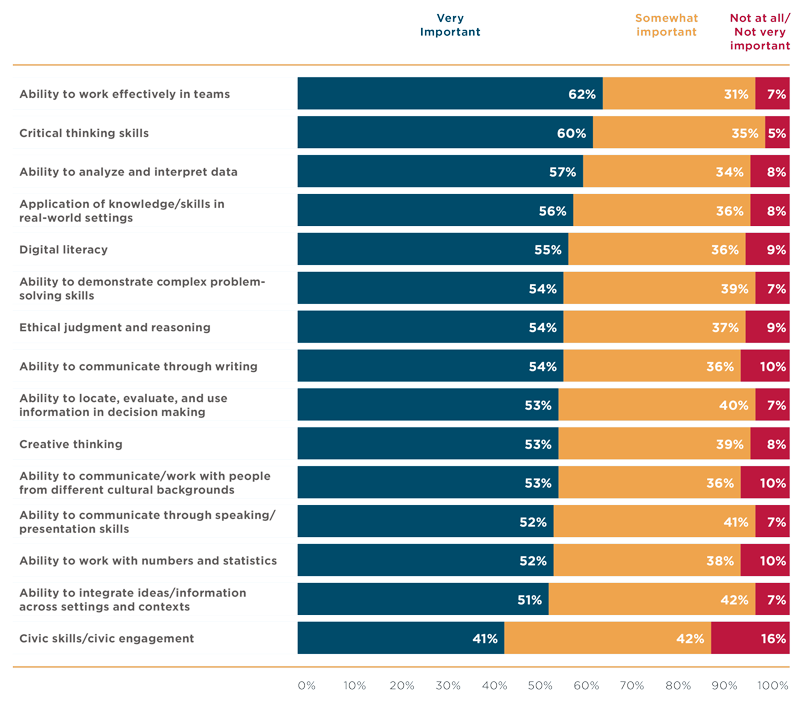



The Advantages of Alternative High Schools: Holistic Success
Alternative high schools, such as Pear Tree School, offer a holistic approach that addresses these gaps. Our method, The Pear Tree Method, integrates academic, social, emotional, physical, and ethical learning into a cohesive framework. This not only prepares students for university success but also for real-world challenges.


1. Thinking Outside the Box: Cultivating Critical Thinking and Problem Solving
Progressive education emphasizes theme-based and project-based learning, which encourages students to explore complex topics in depth. This approach nurtures critical thinking and problem-solving skills, as students must analyze information, draw connections, and propose solutions. For example, a project on sustainable living might require students to research environmental issues, design eco-friendly solutions, and present their findings. This kind of learning used in alternative high schools is directly applicable to university coursework and beyond.
Educational expert Dr. Yong Zhao, a professor at the University of Kansas, argues that traditional education systems are outdated and fail to prepare students for the complexities of modern life. He advocates for a more personalized and inquiry-based approach, which aligns with the principles of progressive education and alternative high schools.
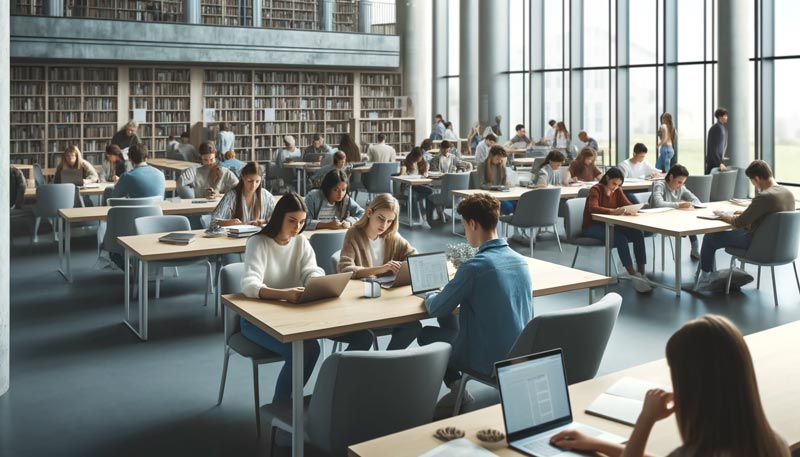

2. Mastering the Art of Research: Independent Learning Skills
In alternative high schools, students learn to conduct independent research, evaluate sources, and synthesize information. These skills are crucial for writing academic papers and navigating the vast amount of information available online. At Pear Tree School, we will teach our high school students how to use academic databases, cite sources correctly, and avoid plagiarism. This contrasts sharply with the reliance on Wikipedia observed in many traditional high school graduates.
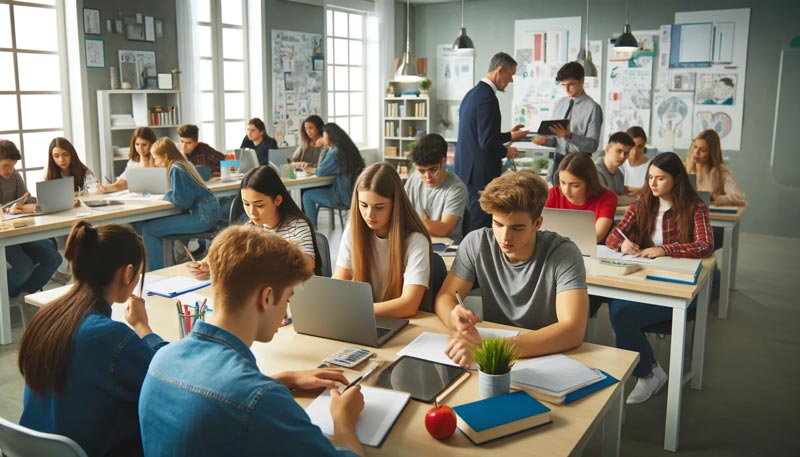

3. From Good to Great: Enhancing Writing and Communication
Writing is a cornerstone of the progressive education model used in alternative high schools. Students are encouraged to express their ideas clearly and persuasively across various formats, from essays to presentations. Our teachers provide continuous feedback, helping students refine their writing skills over time. This prepares them for the rigorous writing requirements of university and professional life.
The late Sir Ken Robinson, an internationally recognized leader in education, long championed the need for creativity and innovation in schools. He believed that fostering these skills is essential for students to thrive in a rapidly changing world.


4. Bridging the Gap: Real-World Applications
One of the criticisms of traditional education is its detachment from real-world application. Alternative high schools using a progressive approach bridge this gap by incorporating practical experiences into the curriculum. For instance, Pear Tree’s students would engage in community service projects, internships, or collaborations with local businesses. These experiences provide valuable insights into the professional world and help students apply their learning in meaningful ways.
Overcoming Misconceptions: Why Parents Should Embrace Alternative High Schools in Vancouver
It’s natural for parents to worry about their children’s future, especially when considering non-traditional educational paths. However, the evidence suggests that progressive education not only meets but often exceeds the preparation provided by traditional high schools. By focusing on critical thinking, research skills, writing, and real-world application, progressive schools like Pear Tree are equipping students with the tools they need for university and beyond.
In conclusion, the fear that alternative high schools won’t prepare students for university is based on misconceptions about traditional education’s effectiveness. By embracing a holistic, student-centered approach, alternative high schools offer a robust preparation that aligns with the demands of higher education and the modern workforce. Parents can rest assured that their children will not only be prepared for university but also for a lifetime of learning and success.
Understanding the benefits of alternative high schools and progressive education is crucial, but finding one in a market dominated by traditional high schools is challenging.
That’s where we come in.
We’re Pear Tree School, and we understand your desire for your child to receive a high school education that truly prepares them for the future.
That’s why we founded Pear Tree School, a place where both girls and boys like yours can thrive academically and emotionally.
Our passion for equipping children with critical thinking, research skills, and real-world applications drives us. Pear Tree School is not ‘just another school’; it’s a place where students develop the skills, knowledge, and values they need for lifelong success.
Curious to see how our progressive high school education can benefit your child?


Benefits You Can Expect


Holistic Educational Experience
The Pear Tree Method, which integrates Theme- and Project-Based Learning, allows students to connect academic knowledge to real-world applications, fostering a deep understanding.


Personalized Learning
Small class sizes and a faculty of masters-educated teachers enable tailored instructional strategies and individual attention, ensuring each student’s unique educational needs are effectively supported.


Strong Community & Supportive Environment
Regular parent-teacher communications, community events, and a whole-school approach to education create a cohesive, supportive environment where students and families are actively involved and invested in the collective well-being and success of the community.
Testimonials
“An exceptional educational experience”
“Pear Tree’s personalized attention and tailored education has significantly contributed to my daughter’s academic growth and confidence”


Jon Ayre
⭐⭐⭐⭐⭐
“Pear Tree students think deeply about the big issues of our day”
“Their project-based learning approach is implemented with an enormous amount of planning and thought, and it shows in the high quality of the children’s work.”


Kate Chase
⭐⭐⭐⭐⭐
“Pear Tree’s learning approach is practical and impactful”
“Pear Tree’s staff are wonderful, very smart and kind, and focused on each individual student’s needs.”


Zahra Hudani
⭐⭐⭐⭐⭐
How it Works


Step 1: Schedule your visit
Start your journey by scheduling an in-person tour or attend one of our introductory webinars. This step allows you to explore our unique educational approach and facilities, and see firsthand how our students thrive.


Step 2: Apply Now
Ready to take the next step? Submit your application through our website. Our admissions team will guide you through the process, including document submission and a family interview to ensure a good fit both for your child and the school community.


Step 3: Welcome to Pear Tree!
Once accepted, you’ll receive a comprehensive welcome package and personalized onboarding session to ease your transition into the school community. We partner with you to ensure your child’s success from day one.
Here’s What You’ll Get…


The Pear Tree Method
Integrates academic, social, emotional, physical, and ethical development, nurturing well-rounded individuals ready for today’s complex world.


Theme & Project-Based Learning
Interweaves subjects through captivating themes and hands-on projects, fostering a deeper understanding and practical application of knowledge.


Small Class Sizes
Ensures personalized attention with only 16 students per class, fostering deeper learning and tailored support.


Advanced Literacy and Math Approaches
Tailored to our themes, our approaches deepen understanding and encourage practical application of essential skills in literacy and mathematics.


Masters-Qualified Educators
All educators hold master’s degrees, providing high-quality, passionate, and expert teaching.


Innovative Use of Technology
Prepares students for the digital age with meaningful technology integration, enhancing learning and 21st-century skills.


Healthy Hot Lunch Program
Daily, chef-prepared nutritious meals, ensuring students enjoy high-quality, balanced diets.


Sustainability and Global Citizenship
Teaches sustainability and global citizenship, preparing students to be conscientious global citizens.


Daily Physical Education
Provides diverse daily physical activities essential for students’ health and integral to their overall educational experience.


Community and Family Engagement
Promotes a dynamic learning environment by fostering strong partnerships with families and the community.

